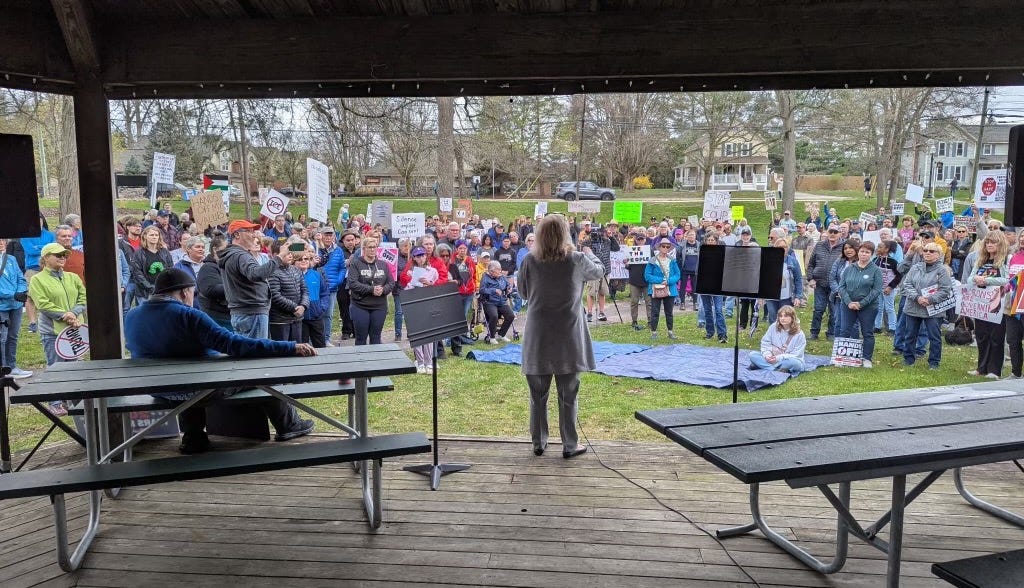Trump stronghold in Michigan is anxious
Trenton constituents expressing worry about freedoms
People in Michigan are genuinely concerned right now, said U.S. Rep. Debbie Dingell.
“People are worried about their country. People are worried about their freedoms,” Dingell told Shifting Gears. “We’ve never had so many protest rallies as we have in the last couple weekends — or in one day. I looked at the police chief Downriver and said, ‘This is the Saturday before Easter.’”
The woman elected to Congress in 2014 sounded intense while describing a non-stop pace that included protests in Dexter, Ann Arbor, Chelsea and Trenton.
Yes, Trenton.
The city long known for its power, steel and engine plants is located on the western bank of the Detroit River and borders Grosse Ile, Riverview, Brownstown Township and Woodhaven.
While Michigan has been a swing state, Trenton has held strong for President Trump:
In 2016, the 10,500 voters cast ballots 53 % to 42% for Trump over Hillary Clinton. Michigan elected Trump.
In 2020, the 12, 083 voters cast ballots 52.32% to 46.01% for Trump over Joe Biden. Michigan elected Biden.
In 2024, the 12,072 voters cast ballots 54.71% to 43.75% for Trump over Kamala Harris. Michigan elected Trump.
Despite the consistent support for Trump over the past decade, Trenton voters showed up this weekend to say they’re worried.

“Downriver, the seniors and the young people, asked, ‘What do you do if the president ignores the courts? If you don't have a person who respects democracy and the three branches of government?’” Dingell said.
People are worried about freedom of speech, freedom of the press and due process, she said. “We need to protect our freedoms. And we have to get money for research grants to the scientists, money for Head Start, food banks, Meals on Wheels for seniors, domestic violence shelters.”
Michiganders on both sides of the aisle worry about speaking publicly, fearful of retribution, Dingell said. Some groups seeking help don’t want to reveal publicly that they’re reaching out to Dingell for fear that their organization could get targeted with cuts.
At this point, Dingell said, protests don’t seem to be exclusively partisan.
“There are so many problems and we absolutely have to be there for people,” she said. “I’ve met with several hundred seniors, veterans, union workers, scientists, African-American students.”

Families and schools have reached out to her about Homeland security actions.
“They’re worried about immigration and student visas, Homeland security subpoenas,” she said. “It's drinking out of a firehose. Seniors are worried about Social Security. And Medicaid, if that gets cut in Michigan, it devastates hospitals and rural providers and long-term care. Then I was in Ypsilanti, and the Head Start people are apoplectic. Funds are frozen everywhere. Researchers and scientists at the University of Michigan have had their grants frozen. Money is not coming through. Their research is jeopardized. Then I talked to a group suppliers who are scared to death of the tariffs. I won’t give up. I have to be there to defend and protect people.”
Dingell, who worked at General Motors in government affairs and previously represented Dearborn, home of Ford Motor Co., has a deep understanding of the auto industry — from the C-suite to the factory floor.
She sees a shift among voters not comfortable with what they perceive to be basic freedoms under threat. She has never been a lawmaker who simply parrots the party line. She made headlines in 2016 when she predicted Hillary Clinton was in trouble in Michigan during the Democratic primary and Donald Trump could win the Republican nomination.
“I was the crazy one,” Dingell wrote in The Washington Post “… At Rotary clubs, local chambers of commerce, union halls and mosques, I noted that we could see a Trump presidency.”
A family legacy of fighting for protection
She is relentless about protecting the family legacy begun by her husband, John Dingell, who represented Michigan in Congress from 1955-2015. His legacy includes work on behalf of the Civil Rights Act of 1964, the Medicaid and Medicare Act of 1965, the Water Quality Act of 1965, the Clean Water Act of 1972, the Endangered Species Act of 1973, the Clean Air Act of 1990, and the Affordable Care Act in 2010.
John Dingell was known as a fearless Democrat who died in 2019, after his wife ran for office in 2014 and won with 65% of the vote. Debbie Dingell became the first non-widowed woman in Congress to succeed her husband. She has won re-election each year since with 62% to 68.1% of the vote.
Debbie Dingell, a former Republican, talks about her constituents as family now.
“What we’re watching now is really unbelievable,” she said, often taking calls from voters directly. She said she wants to hear everything unfiltered.
Especially in Trenton.
“People are speaking up,” Dingell said. “When you look at the size of the crowd turning out, they’re not going to be quiet.”

People of Trenton protested after ICE (Immigration and Customs Enforcement) arrested a father of five, in early March after he dropped off his son at school. Jose Jaimes, a 30-year Michigan resident who owns a home improvement business specializing in painting, was thrown in jail. Federal officials say he is undocumented. Family members say he had a work permit. Community members questioned how a parent can be picked up outside a school at 8 o’clock in the morning and arrested with guns drawn without discussion.
A Fox 2 Detroit records search showed no criminal record. The case is pending.
Trump supporters in Trenton reflect a growing national skepticism toward ICE actions that transcends political party loyalties.
Joe Rogan, host of the #1 podcast on Spotify, said during his April 17 show: “We gotta be careful that we don’t become monsters while we’re fighting monsters. I think due process exists for a reason.”
Rogan, who has 15.3 million followers on the site formerly known as Twitter, endorsed Trump for president on the eve of the general election.
Bracing for what’s next
Most recently, Michigan lawmakers have begun hearing from constituents after Bloomberg reported that White House officials are finalizing executive orders to revoke the tax-exempt status of environmental nonprofits, to coincide with Earth Day on April 22.
Federal budget cuts this year have already slashed jobs and ongoing projects involving the Great Lakes and the National Weather Service.
“The National Oceanic and Atmospheric Administration (NOAA) has halted contract approvals, delayed vessel deployments and cut funding for basic fieldwork,” Nicole Rice, a former communications specialist at the Great Lakes Environmental Research Laboratory — which is part of NOAA and headquartered in Ann Arbor, Michigan — told members of the Michigan Senate last week. “That means no algal bloom monitoring, no shoreline mapping, no new data for forecasts and no shipwreck buoys for divers in our marine sanctuaries.”
NOAA generates and sends weather, water and climate data across the federal government and manages the National Weather Service to provide severe weather warnings.
“Essential functions have been crippled,” said Rice — who had been promoted, fired, rehired and fired again within weeks by the Department of Government Efficiency (DOGE).
While Republicans are avoiding town halls, Democrats are meeting with groups all over the state, Dingell said. “Someone on the City Council in Saline was fired from the NOAA lab and she broke down in my arms and started crying.”

Constituents have called to ask who will provide tornado warnings, Dingell said.
“People are worried about whether there will be danger and having nobody there to warn them,” she said. “People are scared. They’re very scared.”
Urging people to speak up and out
Waiting in an elevator headed to the asthma doctor at the University of Michigan, Dingell said a mother with a child in a wheelchair stated to cry when she talked about the possibility of losing Medicaid.
“People need to know we’re fighting. We’re fighting like hell for the doctors and the researchers and the VA patients,” Dingell said. “You try to raise these human stories to help people understand what’s at stake.”

When asked what she does as a member of Congress in response to addressing current volatility, she said, “litigate, legislate, educate, advocate and communicate.”
Dingell emphasized, “We are introducing bills. We will fight Medicaid cuts and work with colleagues on all sides.”
PS: As a proud member of the Iowa Writers’ Collaborative, a roundup of world-class journalists, I hope you’ll check out the incredible news, commentary and features.




Yep!
Protests are what brought an end to that ridiculous engagement in Vietnam. I can’t read enough articles about protests because it makes me believe that Americans are paying attention.
Thanks for another great article.
PEACE
Gregg Wilczynski
Michigan is lucky to have Debbie Dingel. Iowa has complicit Congressional characters who play to the MAGA base. The weather service cuts will have impact on farming, fishing, tourism and safety. Thanks Phoebe you reporting always hits home.